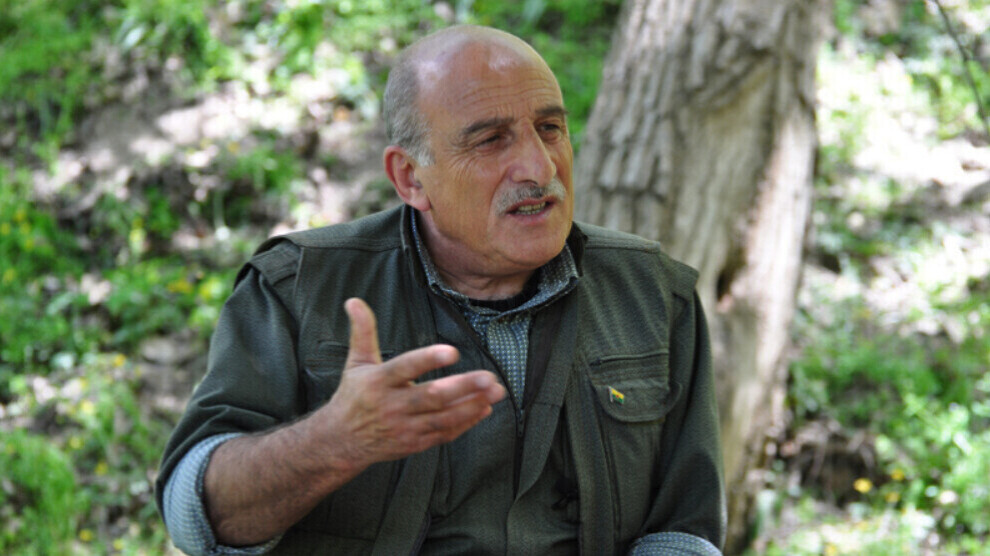Duran Kalkan: Either the world ends or capitalism stops
Duran Kalkan said that "either the world ends or capitalism stops. One cannot expect capitalism to resolve its contradictions."
Duran Kalkan said that "either the world ends or capitalism stops. One cannot expect capitalism to resolve its contradictions."

Duran Kalkan, from the PKK Executive Committee, wrote in a text published on the Kurdistan Workers' Party (PKK) website that "either the world ends or capitalism stops" and added that "one cannot expect capitalism to resolve its contradictions."
Either the world ends or capitalism stops
When there were no European revolutions after the Russian Revolution, theories such as 'socialism in one country, communism in one country and periods of depression in between' were developed.' Rêber Apo [Abdullah Öcalan] refers to this phase as 'the cancerous period of capitalism'. In other words, capitalism means the consumption of nature, society and the individual. At that point, either the world will end, everything will be destroyed, or capitalism will stop. Just as the form of exploitation has been weakened by various thoughts, religions, mythology, science, philosophy and morality since Sumer, there will now be a revolutionary development that will stop and end capitalism. This is the revolution; this is the essence of socialism.”
The age of the democratic revolution
Kalkan speaks about a revolutionary perspective: “If revolutionaries show the way and manage to make a revolution, it is possible to solve the problems and contradictions that led to this war. There is no other way. The world revolution actually depends on the revolution in Kurdistan. Rêber Apo created a new theory of revolution and showed the ideological-political line. He developed their program, strategy and tactics. He defined a new understanding of revolution.
"One cannot expect capitalism to resolve its contradictions"
The paradigm shift developed by Rêber Apo shows what is true and real. Capitalism cannot be expected to soften and resolve its own contradictions. There is no such thing as peace or freedom from conflict in capitalism. It is a constant state of contradiction, conflict, crisis and chaos. Either thought, morality, politics, organization and action will evolve to overthrow, rein in and stop capitalism - and that means socialism - or capitalism will indeed destroy this world.”
“Socialists must have the courage to look critically and self-critically at their history”
Kalkan sees a long continuity in the awareness of the system's destructive potential: "In this respect, the fact that the great liberal thinkers of history have called attention to this danger should not be regarded as fantasy or bogeyman. Rather, it is a situation that has to do with the deep meaning of life, its definition and understanding. Liberal thinkers have foreseen this in almost all epochs. You also saw it in relation to socialism when they said 'Either socialism or annihilation'. But socialism could not take the necessary steps in time, it could not succeed. Those who act in the name of socialism must analyze the last two hundred years of history very well. They must unearth the truth by mustering the strength and courage to be critical and self-critical and free themselves from bossiness, stereotyping or insecurity.”
"The age of national revolutions, nationalism and republicanism is over"
Kalkan points out that none of the conflicting power blocs offers a solution, so a third position is needed: "The third sector, the side of the oppressed, must find a solution through revolution. How are we going to make a revolution that will save humanity and peoples from the scourge of capitalism and fascism? That is the question with which we must concern ourselves. We must focus on this question and give it the greatest importance. The question is not only the Kurdish question. The problem is not only the question of the freedom revolution in Kurdistan, it is the question of the revolution in the Middle East, the question of the revolution of free humanity. There is a revolutionary situation in Kurdistan that is closely intertwined with the world revolution and the revolution in the Middle East. The revolution no longer has a national or country dimension. Yes, we are moving in a space within a society, but the age is no longer the age of national revolutions. The age of nationalism and republicanism is over. Rêber Apo spoke of the era of the democratic republic, of the democratic revolution.
"The nation of attitude is global"
The democratic revolution, of course, develops in a sector within a society, but it is not a local revolution. It is not a revolution limited to one nation. We called this revolution the 'revolution of the democratic nation' and Rêber Apo spoke of a 'nation of attitude'. It is not a nation limited to ethnicity, country and language. It is regional and global.
"Dogmatism and formalism mean falling behind in history"
It's not just about solving the Kurdish question. It is a problem of global proportions. It is necessary to understand this and act accordingly. This is how we should look at the revolution. At this point, it is important to overcome narrow-mindedness. We have to give the right meaning to what we experience. If we don't understand this properly, we can't live life and we can't find a way out. We cannot live and appear as if we are not dead, we cannot experience a new situation and evaluate it from old perspectives. That is dogmatism and formalism. That means falling behind in history.”